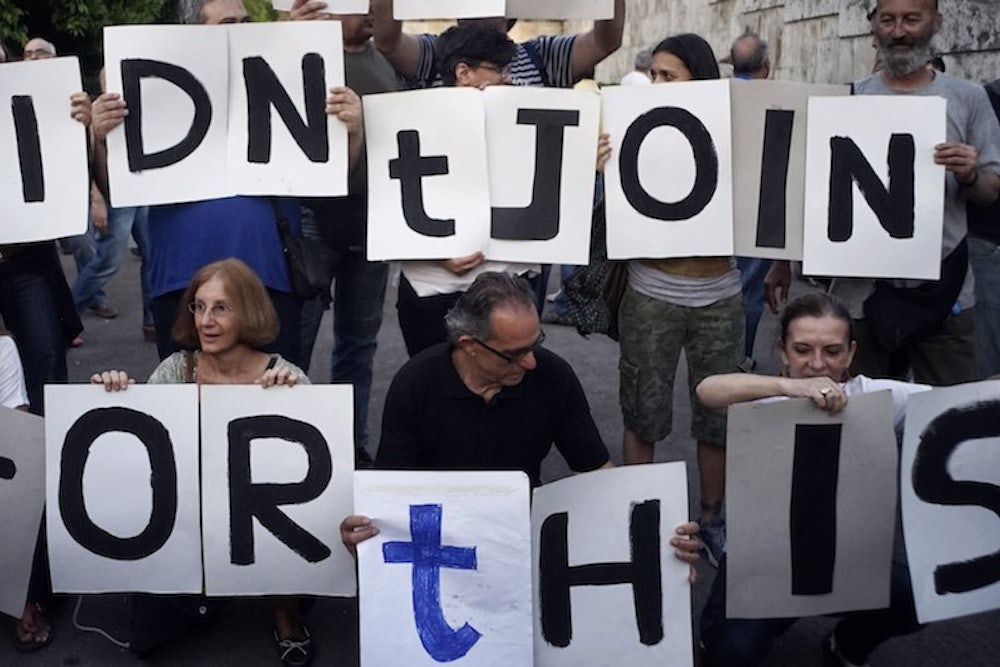Greece’s euro crisis is back in the headlines. After missing the payment deadline on its $1.8 billion debt on Tuesday, the struggling European nation is scheduled to vote in a referendum on Sunday on whether it will accept further austerity or default on its debt—a choice widely billed as a referendum on the euro and the European Union itself. Greek banks shut their doors on Monday, and withdrawals are capped at €60.
Because the situation is entirely unprecedented, no one knows exactly what would happen should the Greeks decide to default. But analysts say that it could lead to the collapse of the Greek economy and a questioning of the viability of the euro across the continent—which would deal the most severe blow to the E.U.’s goal of continental integration in its 63-year history.
All of this sounds very dire, but haven’t we been here before? Since 2010, the media has been filled with periodic stories about crisis negotiations, looming deadlines, and austerity protests. Several media outlets acknowledged this sense of déjà vu this week with headlines like “Greece is in crisis (again), and here’s what you need to know,”“For Greek youth, life has been one crisis after another. So, panic? The bars are full,” and “The Greece crisis doesn’t scare the Eurozone anymore.”
For Berkeley economics professor Barry Eichengreen, who has studied the crisis since 2010, explaining the crisis over and over again is starting “to feel like Sisyphus pushing a rock up a hill. I’ve been writing since 2010 that Greece’s debt is unsustainable and will have to be restructured.”
And it’s not just the public that’s tiring of Greece. “One can visibly see how officials are growing tired of having to fly off to Brussels for one emergency meeting after another,” said Eichengreen. “There is a certain frustration in governments and central banks that other important issues have to be put on hold while the Greek crisis rumbles on. There is certainly a palpable loss of patience in Germany.” While Germans have put billions into bailing out Greece over the years, a March poll showed that more than half of Germans would like Greece to leave the Eurozone (more than 10 percent from the previous month). Greek prime minister Alexis Tsipras may believe the E.U. needs Greece, but Germans are starting to disagree.
There’s actually a somewhat scientific reason behind this kind of apathy and frustration. Psychologists call this compassion fatigue, a form of secondary post-traumatic stress disorder common in nurses, psychologists, trauma specialists, and other medical professionals. It can apply to the public at large, as well: When we’ve heard too much about a particular kind of trouble—no matter how traumatic—we start to tune it out. There’s been evidence of this taking place for decades: In 1991, famine and civil war in Somalia killed around 280,000 people and displaced two million, but received relatively little media attention. In May of that year, Newsweek ran a piece titled “Disaster Fatigue” in which the writers reported that the famine in Africa “has not captured the attention of the world press.” The reason, the writers of the piece hypothesized, was that journalists had “already visited this tragedy, during the sub-Saharan famine from 1984 to 1985 that took more than a million lives.” Despite one Londoner’s attempt to come up with a novel solution (crowdfund Greece’s debt!), the Greek crisis suffers from much of the same problem: The sense that it’s happened before has inured the public to its urgency.
The fact that temporary solutions have been reached in the past has also made it seem less critical: “They either work themselves out of the crisis or there’s another extension. There’s a response cycle established,” said Tulane university professor Charles Figley, an expert in traumatology. “You expect things to work out, because that’s how it happened in the past.”
But the very notion that the Greek problem goes away and then resurfaces captures the essential problem—and the tragedy—of the Greek crisis, according to Brookings Institution fellow Thomas Wright. “It feels repetitive, but this is really the natural culmination of many big forces that have been moving for some time rather than a Groundhog Day situation,” he said. “The disaster is that it continues. There’s no big rupture, and it’s over. It just rolls on.”
